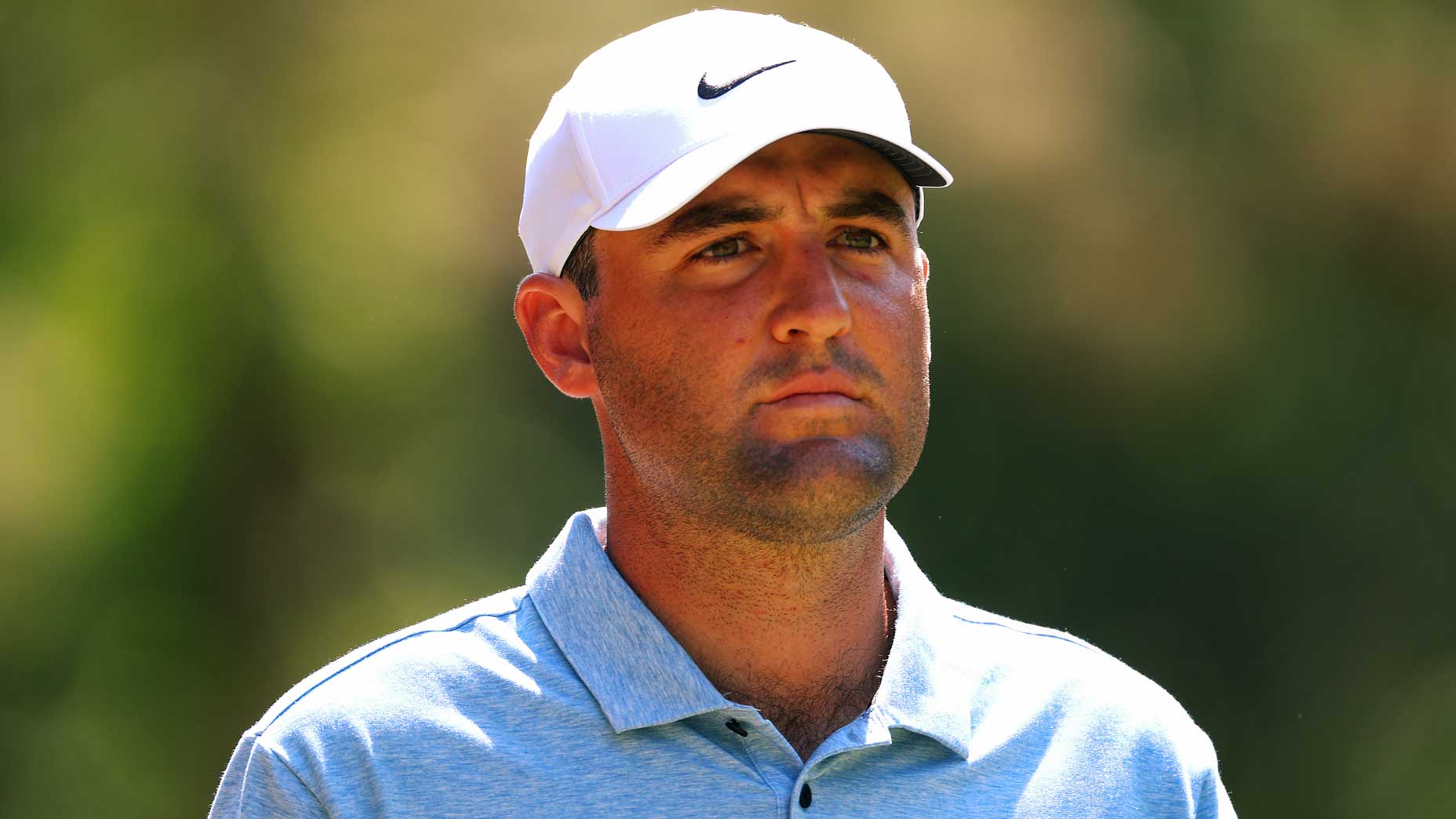Scottie Scheffler provided some Pinehurst insight after his third round at the U.S. Open.
Getty Images
If you were asked to say something nice about Scottie Scheffler, you wouldn’t have a particularly tough time.
You might start with his golf game, which has already produced five PGA Tour wins this season. You could praise his comeback triumph at the Players Championship or his runaway win at the Masters. You could compliment his iron play, which has been preposterously good for multiple years. Or you could marvel at his putting, which has gotten dramatically better in recent months, unlocking all of the above.
You could say that Scheffler seems like a solid family man, the type of guy who was ready to leave the Masters if the call came from his pregnant wife Meredith. Even if you thought that particular storyline was overblown you could point out that a golfer and his wife who hit their local tavern when she’s nine months pregnant to celebrate the big win seem like they’ve got a good thing going.
You could praise Scheffler for the way he’s handled one of the strangest sports scenarios in recent memory, his arrest at the hands of the Louisville Police Department as he headed in to prep for his second round of the PGA Championship. Scheffler handled things respectfully off the course and responded with more terrific play on the course — including a top 10 that week, a runner-up the next week and a victory at last week’s Memorial.
But if somehow that isn’t enough then you could look to the way Scheffler has handled this week’s U.S. Open. He’s been a little bit off from the start; he was outclassed on Thursday and Friday by playing partners Rory McIlroy and Xander Schauffele and battled on Friday just to make the cut on the number. Scheffler was clearly frustrated on the course, particularly on the greens, where he ranks near the bottom of the field. But once he finished? He kept his poise. That was true after Friday’s 74 and it was doubly true after Saturday’s 71, a round that left him definitively outside of contention.
That’s a long way of introducing the idea that Scottie Scheffler had some interesting things to say after his round on Saturday and they provided us with helpful perspective on how Pinehurst has played this week.
Asked for some insight as to how Pinehurst No. 2 would play the rest of the day, Scheffler was clear that things were difficult.
“Definitely tricky pin positions,” he said. “It’s going to get firmer. The sun is out. The wind is blowing enough that the greens are definitely going to dry out. I definitely noticed that coming down the stretch. They’re getting pretty firm. With the way these runoffs are, it’s going to be pretty challenging this afternoon.”
A reporter followed up: Any holes you find to be borderline, dicey?
Scheffler grinned.
“You really want to write about this?”
That word “borderline” echoed the sentiment expressed by defending champ Wyndham Clark earlier in the week. It’s also a charged word when it comes to this championship. Scheffler knows that.
“I think when it comes to the U.S. Open, “borderline” is such, like, a trigger word,” he said. “No matter what I think, you have a pretty good understanding of where you’re trying to hit the ball. It’s when I start not hitting the ball into the places where you should hit the ball, that’s where things get tricky.”
The course proved plenty tough as the day went on, with contenders putting off greens, ping-ponging chips back and forth and making double and triple bogeys at crucial junctures. But was it fair? Scheffler cited the worst hole of his championship, the par-5 5th, where he had a tough time on Friday, and explained the course using that hole.
“I think about No. 5. Yesterday I made double,” he said. “Hit it in the waste area, bad break, can’t get it up on the green. The next one, there’s not enough sand underneath the ball. You can blame it on luck or whatever. I knew not to hit the ball down there. I knew where to hit it and not to hit it. If you’re hitting the ball in the middle of the fairway, in the middle of the green, you can definitely make 18 pars.
“Now, granted misses are going to hurt here more than next week at Travelers. That’s just the nature of the golf course, the nature of the tournament. You’re going to get injured more here for a bad shot than last week at Memorial.
“That’s just how the U.S. Open is.”
The sentiment echoed that of Rory McIlroy, who has said he’s been trying to embrace the challenge of a U.S. Open setup. He described one 151-yard shot that he was trying to fly 146 yards.
“I can’t land it 144, ’cause it’s not gonna get up there,” he said. “And I can’t land it 148, ’cause it’s gonna go over the back of the green.”
So it goes this week. Scheffler put it succinctly, concluding the subject.
“The game of golf is a mental torture chamber at times, especially the U.S. Open,” he said.
Scheffler was also self-deprecating.
“I wouldn’t be using me as a bearing for what’s good. Pretty mediocre at best right now,” he said. But he was also pretty clear: Life’s good. The rest of his day?
“Hit the gym this afternoon, pack up, put my feet up for the rest of the day, hang out with my little man and my wife,” he said. “I’ll show up tomorrow morning ready to play. Like I said, I’ll go to the gym today, wake up in the morning, get ready to come out to the course again, see if I can learn.”
See if I can learn. He’s pretty good at that.
Add it to the list.


